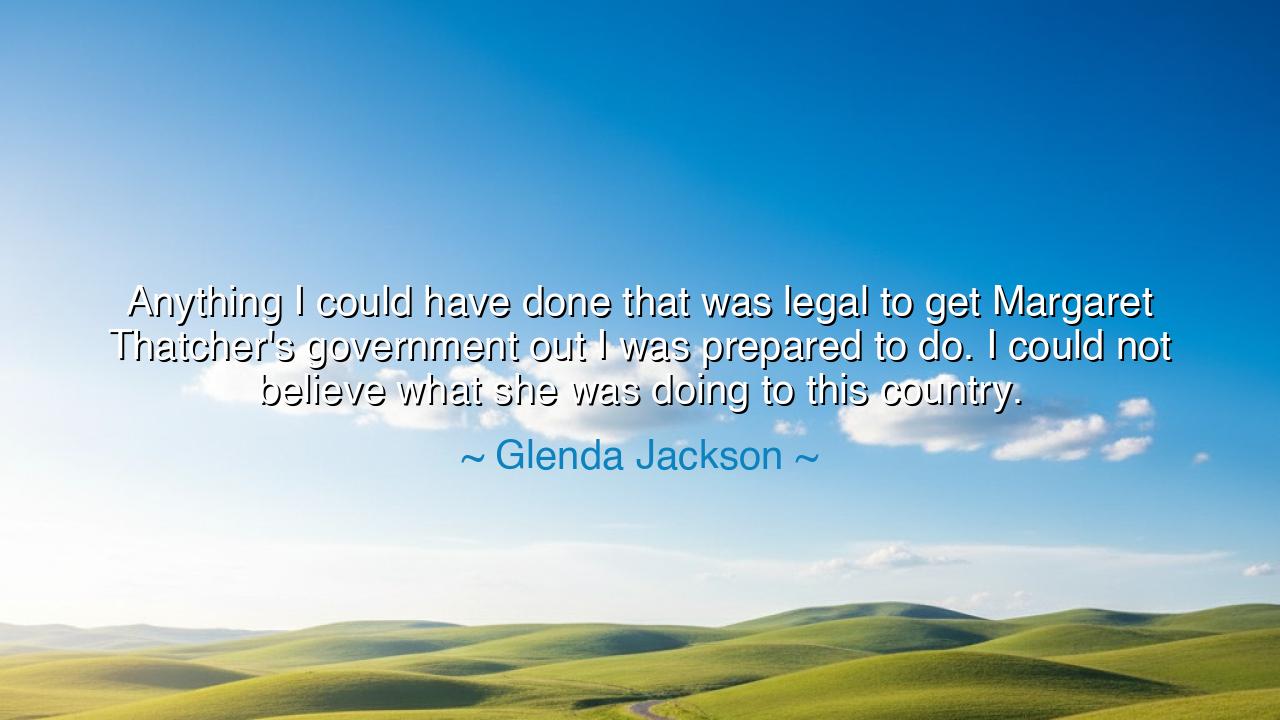
Anything I could have done that was legal to get Margaret
Anything I could have done that was legal to get Margaret Thatcher's government out I was prepared to do. I could not believe what she was doing to this country.






“Anything I could have done that was legal to get Margaret Thatcher’s government out I was prepared to do. I could not believe what she was doing to this country.” Thus spoke Glenda Jackson, a woman of fierce conviction and unflinching moral clarity—an actress turned politician, whose voice burned with the fire of conscience. Her words, sharp as iron and laden with sorrow, speak not of ambition, but of outrage born from love. For they are the cry of one who saw her nation changing before her eyes and could no longer remain silent. In that declaration, she reveals the eternal struggle between power and compassion, between policy and the people it touches. Her quote is both confession and rallying call—a testament to the spirit that refuses to stand idle while justice is undone.
Glenda Jackson, before she was a stateswoman, was already a figure of passion. On the stage and screen, she portrayed characters of immense depth and strength, and in life she was no less commanding. When she entered politics, she did so not for glory but for purpose. Her fury toward Margaret Thatcher’s government arose from the great divide that opened during the 1980s, when the Prime Minister’s economic and social reforms reshaped Britain. To some, Thatcher was a savior of enterprise; to others, she was the destroyer of communities. Jackson, born of humble roots and devoted to the ideals of equality, saw the pain of the working class, the shuttered factories, the erosion of solidarity, and she could not abide it. Her words, then, were not the mutterings of political rivalry—they were the lament of a patriot whose heart broke for the suffering of her people.
To understand the weight of her statement, one must recall the era of transformation in which it was uttered. The 1980s in Britain were years of conflict—of miners’ strikes, of unemployment, of privatization, of fierce ideological battles that tore through the very fabric of society. Thatcher’s policies favored individualism, competition, and market power, yet in doing so, they weakened the communal bonds that had held neighborhoods and towns together for generations. Jackson watched as poverty grew amid plenty, as greed was crowned a virtue, and as compassion was derided as weakness. In such times, her moral outrage became action. She vowed to oppose injustice through every means within the bounds of law, proving that dissent need not descend into destruction—that one can fight fiercely, yet honorably, for what is right.
Her declaration—“anything I could have done that was legal”—is vital. It reveals a profound truth about the nature of moral resistance. In every age, there are those who see wrong and are tempted to fight it through lawless means. But Jackson, though fierce, remained bound by principle. She believed that justice must be sought through just methods. Her battle was waged with words, with votes, with activism—not with hatred or violence. In this, she mirrors the wisdom of the ancients, who taught that virtue lies not only in what one fights for, but in how one fights. The warrior of justice must guard their integrity, lest they become what they oppose. Jackson’s righteousness, therefore, was not born of vengeance but of discipline and devotion to lawful action.
In this, her story echoes that of countless reformers through history. Consider Emmeline Pankhurst, the leader of Britain’s suffragette movement, who too stood against a government she believed blind to justice. Pankhurst’s followers marched, protested, and were imprisoned—not because they despised their country, but because they loved it enough to demand its better self. So too did Glenda Jackson stand, not merely against Thatcher, but for Britain’s soul—for the belief that a nation should measure its greatness not by wealth, but by the well-being of its most vulnerable. In every age, those who love their country most deeply are those who dare to challenge it when it strays from compassion.
Glenda Jackson’s quote, fierce and unyielding, teaches us that anger can be sacred when it is born from empathy. To be “unable to believe” what is happening to one’s country is not despair—it is awakening. It is the moment when comfort gives way to conscience, when silence can no longer be borne. Her spirit calls to every generation: do not look away when injustice thrives beneath legality; do not mistake obedience for virtue. She shows that patriotism is not submission—it is responsibility. To love one’s country truly is to hold it accountable, to demand that it live up to its ideals.
The lesson, then, is eternal: righteous defiance is the heart of democracy. Let every man and woman, when faced with wrongdoing in the halls of power, ask not “What can I gain?” but “What can I do—lawfully, honorably, fearlessly—to set it right?” The path of justice requires both passion and restraint, both courage and conscience. Let us, like Glenda Jackson, speak truth to power, but never let that truth be poisoned by hate.
So remember, children of the future, the wisdom of Glenda Jackson: to oppose injustice is not rebellion—it is duty. When those in power forget compassion, let your voice rise like a clarion. Let your anger be fierce but your actions pure. For a nation’s soul is not preserved by those who agree in silence, but by those who stand in lawful defiance, driven by love, integrity, and the unyielding conviction that what is right must be defended, whatever the cost.






AAdministratorAdministrator
Welcome, honored guests. Please leave a comment, we will respond soon